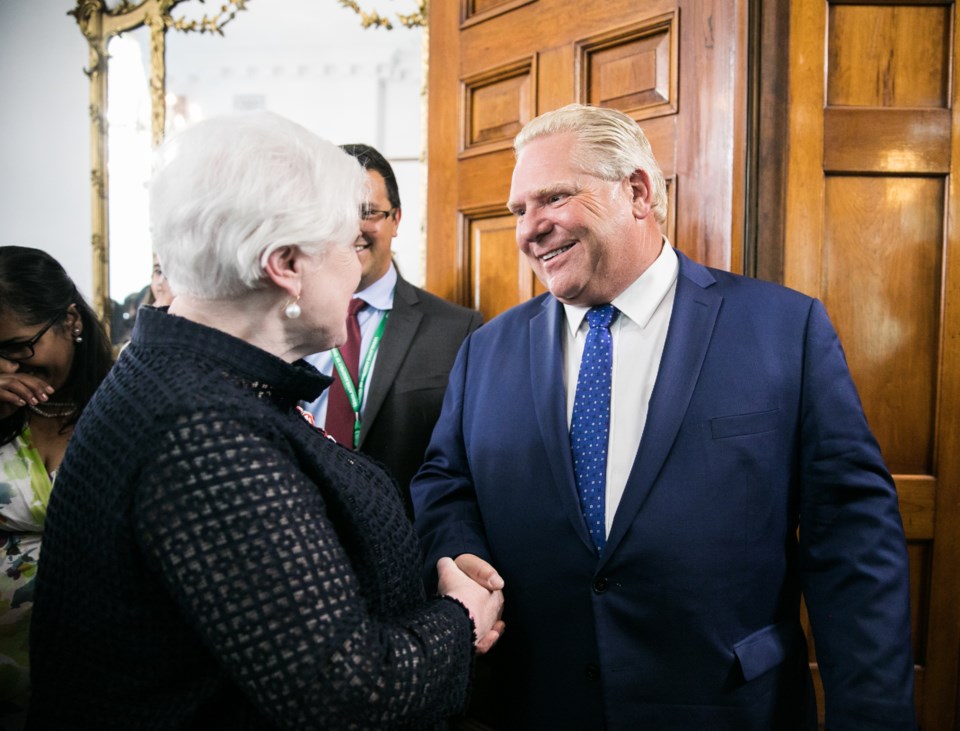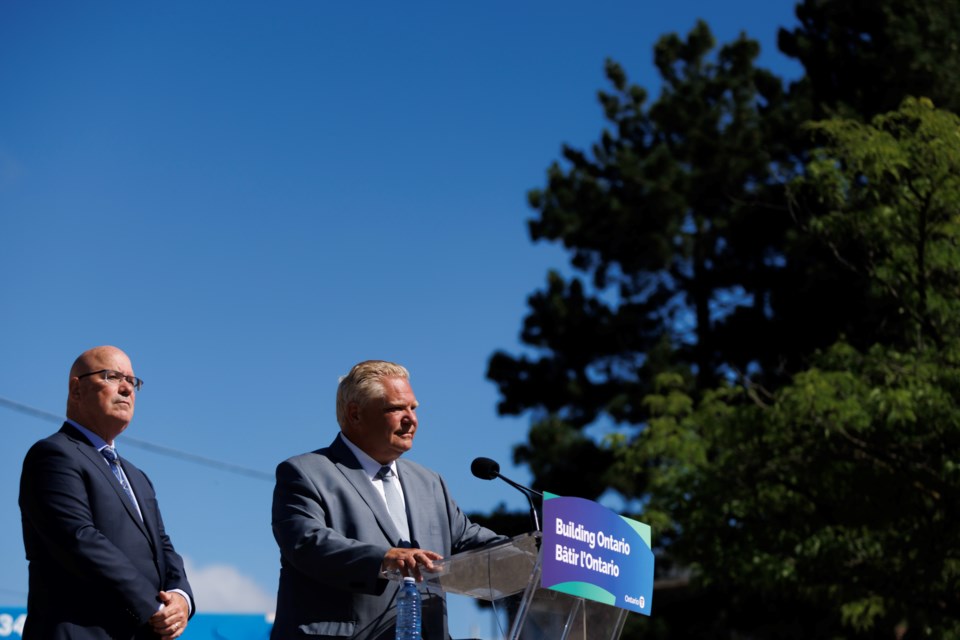A former assistant to Doug Ford broke Ontario’s lobbying law through his work for developers who got land removed from the Greenbelt and his advocacy to the premier for other clients, The Trillium has learned.
Nico Fidani-Diker “contravened the (Lobbyists Registration) Act” in lobbying for five clients, including three developers, according to the Office of the Integrity Commissioner, which posted a summary of findings of its investigation into the lobbyist online on Monday.
Fidani-Diker “failed to comply” with provincial lobbying law by not registering his work for one developer involved in the Greenbelt scandal and by offering Toronto Maple Leafs tickets to two government officials, the integrity commissioner’s office found.
In lobbying for another developer that wanted property removed from the Greenbelt, Fidani-Diker “contravened the Act” by not specifying that goal in his registry filings to the integrity commissioner’s office, it wrote in the summary it published on Monday.
Similarly, but for another developer, the commissioner’s office found Fidani-Diker “contravened” the lobbying law by not stating in registry filings that his client was seeking a minister’s zoning order for a project.
In work for two other clients, Fidani-Diker also broke lobbying rules by “knowingly placing a public office holder in a position of real or potential conflict of interest,” added the commissioner’s office. While not explicitly mentioned in the office’s summary, The Trillium has confirmed the “public office holder” to be Ford.
“I want to thank the Integrity Commissioner and his office for their thorough work and review of this matter,” Fidani-Diker said in a statement. “I accept full responsibility for his decisions and findings regarding my initial months as a registered lobbyist, when setting up my company three years ago.”
“It was never my intent to be in non-compliance while lobbying. These oversights were mine and mine alone,” he added. “I view it as a privilege to be able to offer my clients thoughtful advice as it relates to matters of public policy and I’m committed to upholding the highest standard of integrity in my professional activities.”
The integrity commissioner’s office, which oversees lobbying of the provincial government, chose not to suspend him from lobbying — the more serious penalty it can levy. His only punishment was the office’s publication of its summary of his “non-compliance” with Ontario’s lobbying law, which the commissioner can choose whether or not to do.
“Since 2022, we have instituted strict internal compliance on all registerable activities and have maintained a strong record — free of any issues outside of these events — and we will continue to do so,” Fidani-Diker added in his statement. “I thank the Integrity Commissioner for bringing closure to this matter and for his recognition that no further action from his office is necessary.”
Greenbelt gaffes
Fidani-Diker has worked as a lobbyist since mid-2022. The firm he co-founded, OnPoint Strategy Group, launched that summer. He worked for the PC Party before then, since early 2021. Before that, he had worked in the premier’s office under Ford since 2018.
The Ford government’s plan to remove land from the Greenbelt came together in the summer and fall of 2022. Late that year, it removed 15 land parcels, totalling 7,400 acres, from the area under strict provincially imposed protections, promising developers would build 50,000 homes on the properties.
Ontario’s auditor general’s office later estimated in its special Greenbelt report that developers owning the removed land stood to benefit by upwards of $8.3 billion. Both the auditor general’s and integrity commissioner’s offices found that most of the specific removed properties originally came from developers or lobbyists, whose connections with Ford government officials advantaged them.
Amid intense public scrutiny, sparked by news reports on would-be Greenbelt developers’ connections with Ford and other Progressive Conservatives and fuelled by the auditor’s and commissioner’s reports, the premier apologized for the land removals in September 2023. His government reversed them that fall.
The Royal Canadian Mounted Police have been investigating whether there was a criminal element behind the Greenbelt scandal since fall 2023. Fidani-Diker’s lobbying work has not been a focus of their probe, according to a few sources of The Trillium’s who have spoken to RCMP investigators.
Many of the 30 clients he’s registered to lobby provincial officials on behalf of are homebuilders.
The non-compliance summary posted online by the integrity commissioner’s office doesn’t name specific clients of Fidani-Diker nor the provincial officials he lobbied. Information from previously published reports, obtained documents and sources can offer more context about his violations.
He had contracts with three developers who stood to benefit from the Ford government’s Greenbelt removals, helping two of them secure the inclusion of their relatively small properties, according to the integrity commissioner’s office’s investigation into them. In the fall of 2022, Fidani-Diker had a number of calls and meetings with senior staff of Ontario’s then-housing minister, while they hurried to gather information about properties to remove from the Greenbelt, the commissioner’s office found.
The development company Fidani-Diker had registered for was Alinea Group, which owned a 31-acre property that was part of the Greenbelt removals. The lobbyist’s Sept. 21, 2022, filing to the registry overseen by the commissioner’s office did not mention the Greenbelt. Instead, it said his goal was to “demonstrate the economic and social benefits of proposed development sites and work with public office holders to move projects forward in a timely manner.”
He didn’t file a registration on behalf of Peter Tanenbaum, who contracted Fidani-Diker to help with his pursuit to get the Ford government to remove 86 acres of land he owned in Clarington from the Greenbelt. Tanenbaum also hired another lobbyist, who the integrity commissioner’s Greenbelt report referred to as “Mr. X,” to take the lead in directly communicating with Ford government staff.
The integrity commissioner implied in his Greenbelt report that he used the “Mr. X” pseudonym because he was the subject of a follow-up investigation under the Lobbyists Registration Act, which limits what can be said about them.
The Trillium and other news outlets confirmed “Mr. X” to be John Mutton, a former mayor of Clarington, a few days after the commissioner’s office released its Greenbelt report.
The report noted that Tanenbaum showed the commissioner’s office an email in which Mutton “reported plans for lunch, golfing and a Raptors game” with the then-housing minister’s top two staffers. Ministerial staff generally aren’t allowed to accept gifts like these from lobbyists. It hadn’t mentioned that Fidani-Diker offered “a gift of tickets to a Toronto Maple Leafs hockey game” to two provincial officials, which was one of the ways the commissioner’s office found he had broken lobbying rules working for a would-be Greenbelt developer.
Fidani-Diker is the second person whose government advocacy work played a part in the now-reversed Greenbelt removals to be found, so far, by the integrity commissioner’s office to have contravened lobbying rules.
In August, the commissioner’s office published another summary of non-compliance, explaining that lawyer Katarzyna Sliwa had broken the law by not registering to lobby, despite sending letters to government staff requesting that land owned by Shakir Rehmatullah and other developers be removed from the Greenbelt.
Another developer ding
The other Lobbyists Registration Act violation the commissioner’s office found Fidani-Diker made working for a developer was unrelated to the Greenbelt.
“This client was seeking a Minister’s Zoning Order,” said the commissioner’s office’s summary, adding that Fidani-Diker “contravened the Act by failing to provide particulars to identify the regulation change he was seeking.”
Minister’s zoning orders (MZOs) are a regulatory tool the provincial government — most often the housing minister — can issue to overrule municipalities’ planning bylaws and rules. The Ford government’s use of MZOs has been controversial. It’s issued more than every previous Ontario government combined.
Fidani-Diker’s client was in 2023 seeking an MZO “to increase the permitted building height and density on its property,” according to the integrity commissioner’s summary.
The Ford government issued 10 MZOs in 2023, including one that May to raise building height limits to double the number of housing units allowed in a massive lakefront project in Mississauga. Since late 2022, Fidani-Diker has been registered to lobby the provincial government on behalf of the conglomerate of builders planning the development. His filings to the provincial lobbyist registry never mentioned he was seeking an MZO on their behalf.

Too close for comfort
The integrity commissioner’s office found that Fidani-Diker broke lobbying rules for another two unidentified clients by “knowingly placing a public office holder in a position of real or potential conflict of interest in the course of lobbying him.”
Although the commissioner’s office is prevented by the Lobbyists Registration Act from naming the “public office holder,” and Fidani-Diker didn’t say who it was in his statement, The Trillium has confirmed that, in these cases, it is Premier Ford.
The commissioner’s office’s summary does add that the “public office holder” was someone “Mr. Fidani-Diker had a prior close working relationship, had recently engaged in significant political work with … and had a friendship with.” It notes, as well, that “Mr. Fidani-Diker had a long history of a close relationship with this public office holder.”
Ford’s and Fidani-Diker’s families have been friends for decades. Fidani-Diker started working in politics for the premier’s late brother, Rob, while he was mayor of Toronto and Doug Ford was a councillor in Etobicoke, where they’re all from.
Fidani-Diker helped Ford get elected premier in both 2018 and 2022. The pair worked very closely from 2018 to 2020 when Fidani-Diker was Ford’s executive assistant.
Fidani-Diker also attended the premier’s daughter’s 2022 wedding and the stag-and-doe fundraiser that Ford hosted at his house beforehand. He also remains a member of the PC Party executive, according to the party’s website.
“We have not been engaged in this matter and have no details beyond what the Integrity Commissioner has reported,” a spokesperson for Ford’s office said in a statement to The Trillium. “We expect that anyone engaging with or advocating to the government complies with all rules and regulations as set out in legislation.”
Provincial law makes it lobbyists’ responsibility to not “knowingly” put the premier, cabinet ministers, MPPs, government staff and others in positions of “real or potential conflict of interest.”
The integrity commissioner’s office has had the authority to investigate lobbyists since 2016. It’s used the power somewhat sparingly. Lobbyists file thousands of registrations to its office each year. Since 2016, it’s launched about 15 investigations into lobbyists each year, on average, according to its annual reports.
Most times, it’s found lobbyists have broken the law, it hasn’t published their name. Before Fidani-Diker, it had only published seven non-compliance notices on its website, according to information provided or published by the office.
This story was updated with more information and comments after it was initially published.



.png;w=120;h=80;mode=crop)
